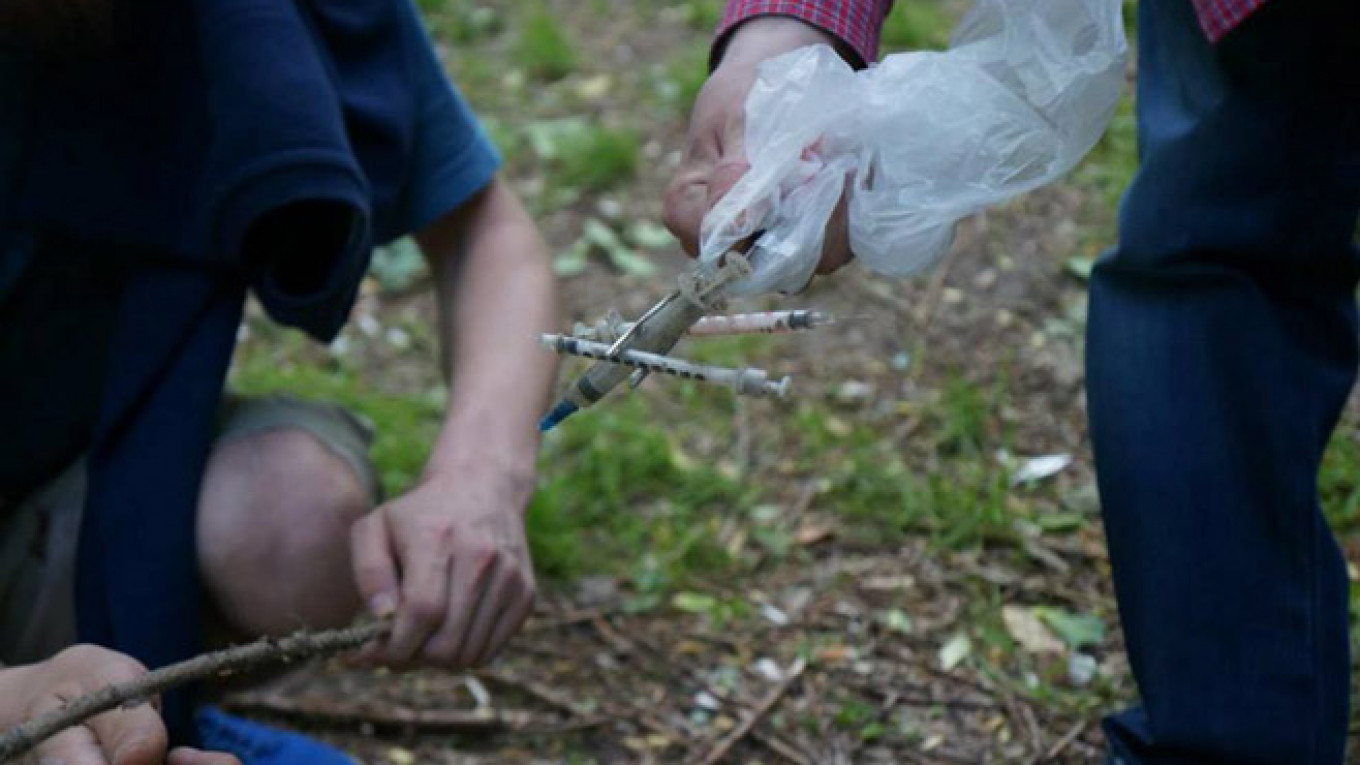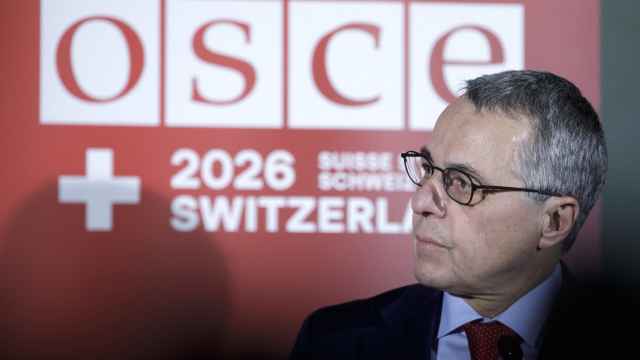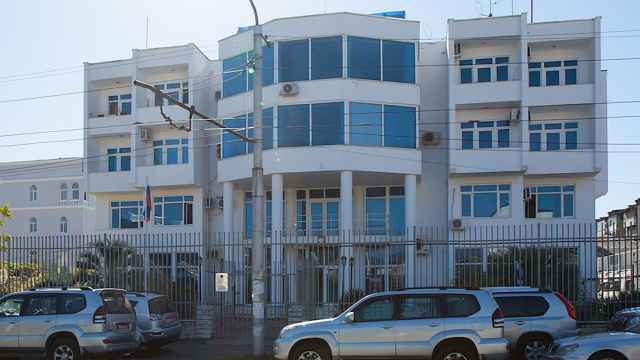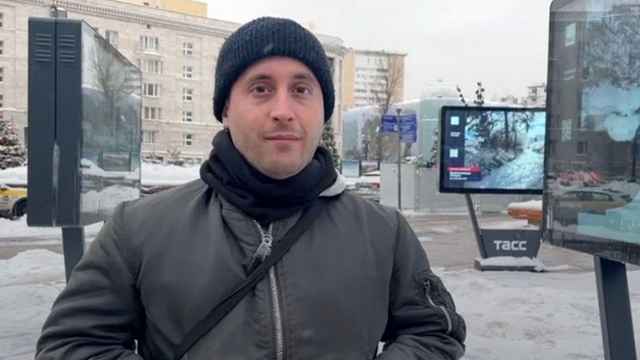As the world marks the United Nations' International Day Against Drug Abuse and Illicit Trafficking on Thursday, millions of drug addicts in Russia have nowhere to go for treatment, and specialists are in despair over the lack of progress in the country's rehabilitation system.
The Federal Drug Control Service, or FSKN, recently announced plans to create a system of communes to treat drug addicts, but drug counselors dismiss such statements as empty promises.
"Sometimes it seems that the Federal Drug Control Service just says these things every few months to remind people that they exist," said Anya Sarang, president of the Andrei Rylkov Foundation for Health and Social Justice, a grass roots organization in Moscow that seeks to promote awareness of drug addiction and develop a humane drug policy.
"For five years now, they have been in charge of this program [to develop a national rehabilitation system] and they have not managed to do even the most basic things required," Sarang told The Moscow Times.
Currently, the country's state-run rehab centers are few and far between, and therefore often full. In addition, experts say the medication used at the centers and the lack of psychological counseling mean that the centers are not effective.
Working for Freedom
In January, President Vladimir Putin instructed the FSKN to finalize its inter-agency program for a nationwide rehab system, which had seemed to be dead in the water ever since it was ordered by government decree in 2010.
Viktor Ivanov, head of the FSKN, said last week that the plan was ready and would include the creation of communes in rural areas where drug addicts ordered by courts to get treatment would undergo labor therapy.
"Therapeutic centers and communes will be set up in those regions where there are vast areas of unoccupied farmland and a shortage of manpower," Ivanov said in comments carried by Newsru.com, adding that a similar system was in place in Italy and had proven to be effective.
More than 70,000 people die each year in Russia from drug abuse, about 30,000 of them from heroin, according to the FSKN. Millions more suffer from dependency, with an estimated 8.5 million drug addicts in 2013, according to an FSKN report.
Most troubling of all, that figure has skyrocketed in the last few years: In 2010, there were 2.5 million addicts.
Although Ivanov has repeatedly hailed Russia's rehab centers for having a high success rate in treating patients, Sarang said the figures cited by the director of the agency were likely "numbers chosen at random."
"There is no research to prove what he is saying; he is not held accountable for his words," Sarang said, describing the current situation as a "complete flop."
Catch 22
The situation is undeniably Kafkaesque: Last November, Putin signed a law giving courts the right to send drug addicts for mandatory treatment — but there is virtually nowhere to send them.
At the same time, the federal agency in charge of prosecuting drug-related offenses is now simultaneously taking upon itself the responsibility of curing the offenders.
Marat Aginyan, a psychiatrist specializing in drug addiction at Moscow's Center for Healthy Youth who also works with the National Anti-Drugs Union for Rehabilitating Addicts, was upbeat about Ivanov's plans to build communes, but expressed concern over the FSKN being put in charge of curing addicts.
"Their task is to target the supply, not the demand," Aginyan said, adding that "addicts are not going to go up to an agent from the drug control service and say 'Cure me, please.' The agency is meant to hunt down addicts, and their strong-armed approach will be reflected in their initiatives."
Sarang was equally skeptical of the agency's treatment initiatives, saying they were barking up the wrong tree by focusing on court-ordered treatment for drug addicts.
"There is no progress … because instead of working on elementary things like establishing centers to train specialists or creating a program for licensing [rehab centers], officials are making idiotic statements" such as the communes initiative, Sarang said.
Details, Funding in Short Supply
Despite the scale of the drugs epidemic sweeping the country and its steady growth, Ivanov has repeatedly complained that no money has been allocated for the state rehab program.
The Moscow branch of the FSKN launched a test program on June 1 allowing those with low incomes to receive free treatment at privately owned clinics that agreed to take part and provide their services for free.
The experiment is set to run through the end of the year, with the city's Health Department and Department for Social Protection helping to coordinate efforts.
The list of participating clinics on the Department for Social Protection's website could not be accessed, however, and the FSKN had not responded to a request for comment by the time of this article's publication.
Details about another initiative by the Moscow branch of the FSKN also remained vague.
Last December, Alexander Prostokishin, deputy head of the branch, announced the impending opening of a rehab center in the Stupinsky district, a Moscow suburb.
The center would use labor therapy and agricultural work, he told RIA Novosti, prefiguring Ivanov's plan for the communes.
But Prostokishin was mum on the details, saying only that the head of the city's Health Department had signed off on the order to set up the center. It is unclear when the facility is due to open, and Ivanov's repeated calls for financial help leave little room for optimism.
Ivanov has been practically begging the government to finance rehab centers for months, openly stating in December that "the country has no money for rehabilitation."
"The problem of 8 million drug users and 30 million of their relatives will remain outside the sphere of the government's activities. The rehabilitation program has officially been approved, but without money the program will not work," Ivanov was cited by Gazeta.ru as saying at the time.
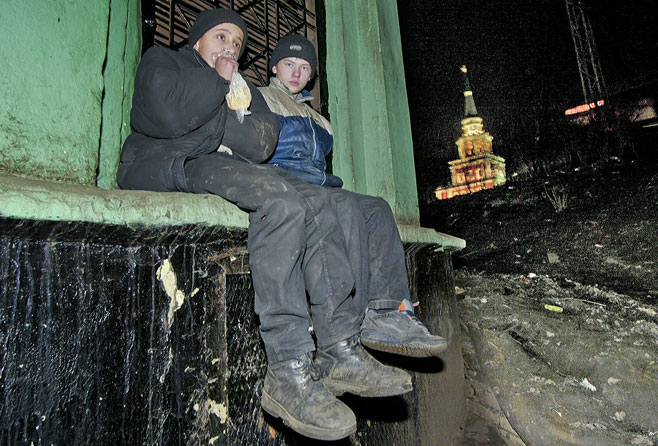
Two young glue-sniffers pictured in Moscow in 2002. The number of drug users has skyrocketed since then.
An Expensive Luxury
Apart from the few state-run centers, the only other option for those seeking treatment is private clinics or centers connected to the Church.
Private treatment does not come cheap: One night in Adelvez, a clinic in Moscow offering detox services, costs 7,800 rubles ($230). Longer-term rehab, which includes psychotherapy, costs anywhere from 35,000 rubles to 600,000 rubles a month, according to the clinic's website. The program costs vary as courses are drawn up according to the needs of the individual patient.
For those who cannot afford that, tough luck.
"If you could see it, you would not believe it: a drug addict sitting in a clinic and crying because he wants to be treated, and they do not want to or cannot treat him," wrote a member of the online forum Stop-Drugs.net who identified himself as Roma, describing his brother's attempt at getting clean in one of a handful of state-run clinics in Moscow.
Sarang said she sees the same scene almost every day: "There are people who need treatment, and there is nowhere to send them."
Cowboy Clinics
Even when addicts find a place in a church-run clinic or private facility, there is no proper licensing mechanism in place to ensure that those running such centers are qualified and properly trained, Sarang said.
In 2011, a patient at a private clinic in Siberia's Kuzbass region died while undergoing treatment. The director of the center, Andrei Charushkinov, was found guilty of murdering the patient in 2013 and sentenced to nine years in prison, Newsru.com reported.
Investigators later established that Charushkinov, founder of the Transformation of Russia religious network of rehab clinics, had been abusing patients for years.
A warning about rampant abuse at the center can still be found on Stop-Drugs.net.
"Transformation of Russia is completely hypocritical. How is it possible to spend the day beating a person with bats in the sports hall, and then in the evening sit around calling everyone 'brother' and talking about Jesus and God, and that we need to strive for kindness?'" one forum user wrote.
The organization was later shut down at the behest of the Justice Ministry.
Western Approaches
Other private centers have received high praise from former patients.
Yulia, a recovering addict who asked for her surname to be withheld from print, said a private clinic in Bashkortostan using a 12-step program had helped her turn her life around and get her daughter back from her parents' custody.
"At the center where I finally got better, they used psychotherapy instead of drugs … My mom had previously tried to send me to a "narcologist" [drugs specialist] but regretted it — they just injected me full of medication. The problem of addiction is in your head; the body just demands more chemicals. You need to confront the reasons for your drug abuse and genuinely want to get better if you want to be successful," Yulia said.
Anton Zavartsev, a former drug addict who opened up his own private clinic in Chelyabinsk after overcoming his addiction, said the most effective method — both for him and others he had known — was the 12-step program commonly used in the West, and currently found only in private clinics or religious centers in Russia.
Zavartsev's center, the Growth Foundation for Rehabilitation, uses the same method, which Zavartsev credits with saving his life and giving him a second chance.
Tranquilizers Instead of Treatment
Zavartsev echoed the criticism of the government program, saying that it had no effective way of fighting drug addiction, and that most state-run centers were known for "just injecting patients full of drugs and turning them into vegetables, thereby making them dependent on another drug."
Russia's use of anti-psychotics to treat drug addiction has been slammed by activists and specialists who seek to develop a more human policy toward drug addicts.
"The use of antipsychotics like Haloperidol has its roots in repressive Soviet psychiatry. At that time, these drugs were used to break the will of political prisoners and dissidents … But they are still used now to treat drug addiction," a 2012 report by the Andrei Rylkov Foundation concluded.
In other countries, Haloperidol is mostly used to treat schizophrenia, though it is still used in many treatment facilities in Russia for drug addiction.
Public Fallout
Equally troubling for many is the government's prohibition of using methadone to treat heroin addiction, widely used in the West to wean addicts off heroin.
Experts including Sarang argue that allowing methadone treatment would at least ensure addicts were using clean syringes in a controlled environment, and say its ban is hindering efforts to slow the spread of HIV in the country.
According to the Health Ministry, 463 out of every 100,000 Russians are HIV positive.
The World Bank estimated in 2013 that by 2020, the country would lose 20,000 people a month to AIDS.
With no access to methadone, heroin addicts continue to shoot up in public places, creating a public health risk from used syringes.
Activists and volunteers at the Andrei Rylkov Foundation regularly conduct campaigns to collect and dispose of all the used syringes that are a common sight in Russian parks, including near children's playgrounds.
"There is no utilization or recycling, no syringe exchange programs … nothing … so sometimes we have to organize voluntary cleanups to collect them and dispose of them safely in a hospital," Sarang wrote on Facebook.
Russia is the world's largest consumer of heroin, with the country's market for the opiate estimated at $6 billion by various sources. The United Nations said last year that 75 tons of heroin was being brought into the country annually, though Russian analysts said that figure was closer to 10 tons a year.
Apart from heroin, there is a flourishing market in Russia for highly addictive synthetic marijuana and a cheap, easy-to-make concoction of codeine pills known as "krokodil" — a lethal brew that gets its name as it literally eats the user's flesh at the injection site.
See also:
Sanctions Disrupt Joint Efforts in the War on Drugs
Contact the author at [email protected]
A Message from The Moscow Times:
Dear readers,
We are facing unprecedented challenges. Russia's Prosecutor General's Office has designated The Moscow Times as an "undesirable" organization, criminalizing our work and putting our staff at risk of prosecution. This follows our earlier unjust labeling as a "foreign agent."
These actions are direct attempts to silence independent journalism in Russia. The authorities claim our work "discredits the decisions of the Russian leadership." We see things differently: we strive to provide accurate, unbiased reporting on Russia.
We, the journalists of The Moscow Times, refuse to be silenced. But to continue our work, we need your help.
Your support, no matter how small, makes a world of difference. If you can, please support us monthly starting from just $2. It's quick to set up, and every contribution makes a significant impact.
By supporting The Moscow Times, you're defending open, independent journalism in the face of repression. Thank you for standing with us.
Remind me later.


